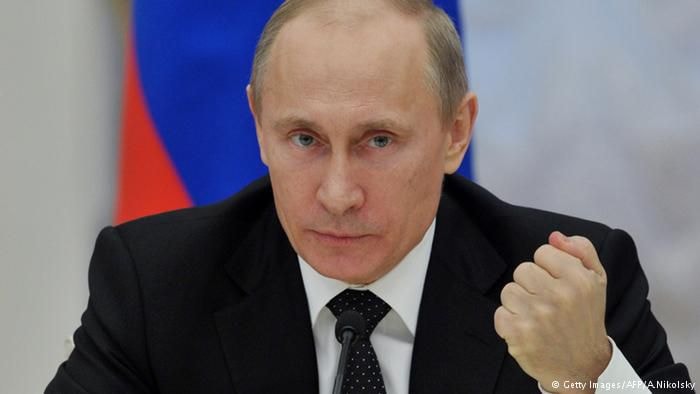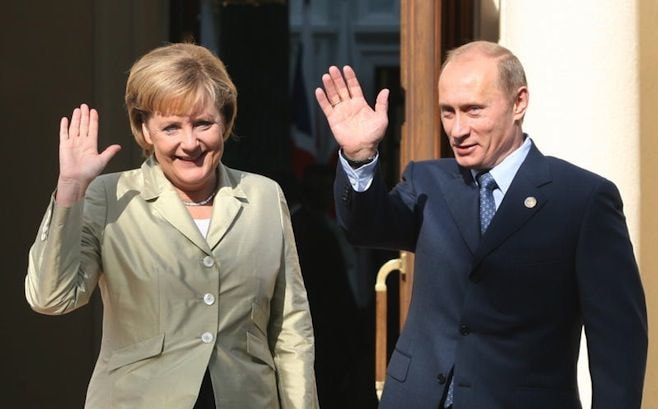Germany opens the door: Is Russia enthusiastic about returning to the G8?
(Baonghean) - "The G7 never wants to isolate Russia or maintain the G7 group instead of the G8 for a long time" - this is the latest statement by German Foreign Minister Frank-Walter Steinmeier, showing a clear goodwill from the European leader in the relationship with Russia. In fact, Europe needs Russia in a series of issues such as the refugee crisis or the issue of counter-terrorism.
G7 changes attitude
In 1998, the G7 group of leading industrialized nations, comprising Britain, Canada, France, Germany, Italy, Japan and the United States, was officially expanded to the G8 with the participation of a new member, Russia. But the incident happened last year - the year Russia held the rotating presidency of the G8.
After Russia annexed Crimea, the bloc's member states made a 180-degree turn and boycotted the summit scheduled to be held in Sochi in protest against Moscow's decision.
 |
| President Vladimir Putin has completely changed Russia's position globally in just one year (Source: AFP) |
The G7 summit was then held in Brussels, Belgium, without Russia. The G7 leaders firmly stated that things would return to normal only when Russia returned Crimea to Ukraine.
In response, Russia also bluntly declared that Crimea was an indivisible part of Russian territory. After these developments, President Putin was completely isolated at the G20 Summit in November 2014 and left before the conference ended.
In the latest developments, the situation has completely changed. German Foreign Minister Frank-Walter Steinmeier stated that isolating Russia for a long time is not what the West wants. Mr. Steinmeier also affirmed that the G7 does not want to be a long-term G7 but wants to restore the G8.
A hint for Russia to return to the G8 could not be clearer!
The German Foreign Minister outlined two specific conditions for Russia to return: cooperation with the West in resolving the Syrian crisis and efforts to resolve the conflict in Ukraine.
In fact, similar invitations have been sent to Russia by Germany and several European countries many times over the past year. But in the current context, this invitation has become more “earnest” than ever when Russia has turned the tables on all fronts: anti-terrorism, the crisis in Syria and the immigration crisis in Europe. Russia’s position has become even clearer after the bloody terrorist attack in Paris (France) on November 13.
Former French President Nicolas Sarkozy and current President Francois Hollande both called for an international coalition against IS, emphasizing the indispensable role of Russia. Even the British Prime Minister, who has a tough stance on Russia, has expressed support for Russia's presence in the global anti-terrorist coalition.
Meanwhile, US President Obama did not mention Crimea at all during his recent meetings at the G20 Summit, although the Ukraine issue was raised with his counterpart Putin. This shows the considerable “condescension” that the US has shown to its longtime rival.
Europe needs, Russia still thinks
On November 16, President Vladimir Putin said that Moscow had offered to restructure Ukraine's $3 billion euro bond debt that Russia holds into three parts, each worth $1 billion, over the next three years. Speaking about this move, Russian Prime Minister Dmitry Medvedev affirmed that Russia did not ask the West to lift sanctions against Moscow and did not respond to Germany's request to return to the G8.
In fact, Russia has never shown any interest in this proposal. According to Russian Foreign Minister Sergei Lavrov, the G8 is simply a club where leaders of major countries gather to discuss issues of common concern.
President Putin did not even discuss this topic during his meeting with German Chancellor Merkel in May, even though Germany is Russia's most enthusiastic European partner.
 |
German Chancellor Angela Merkel is enthusiastic about mending relations with Russia and President Vladimir Putin (Source: The Moscow Times) |
According to observers, Russia is currently interested in emerging alliances - playgrounds that are ready to welcome Russia and are not as "strict" as the G7. These are the BRICS developing countries, the Asian Investment and Development Bank (AIIB) or the Eurasian Economic Union. After all, the G7 or G8 are just formalities for Russia, because important decisions can only be discussed effectively within the G20 framework.
The current situation shows that in the cold “confrontation” between Europe in particular, the West in general and Russia, Russia is taking the initiative. Because Russia’s position is now different, Russia has the right to set a new price for itself. Also because Europe is still maintaining, even continuing to extend sanctions against Moscow related to the Ukraine issue.
Phuong Hoa
